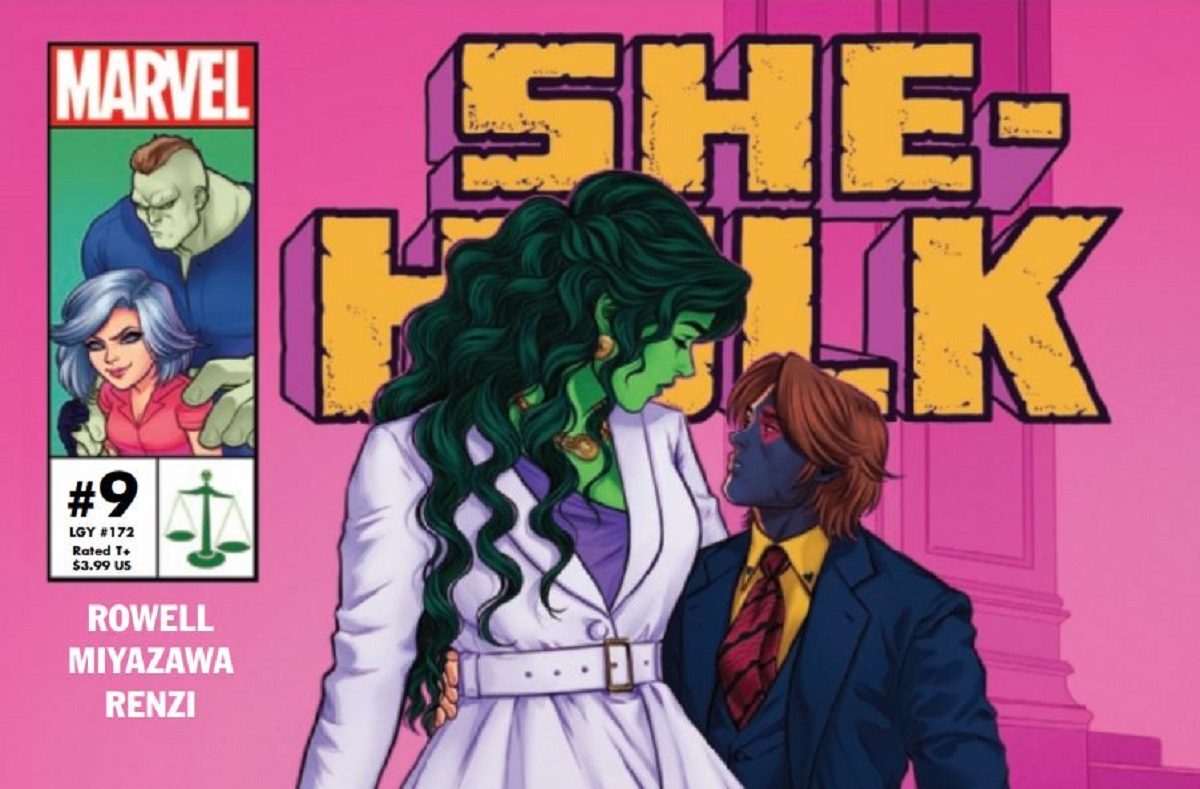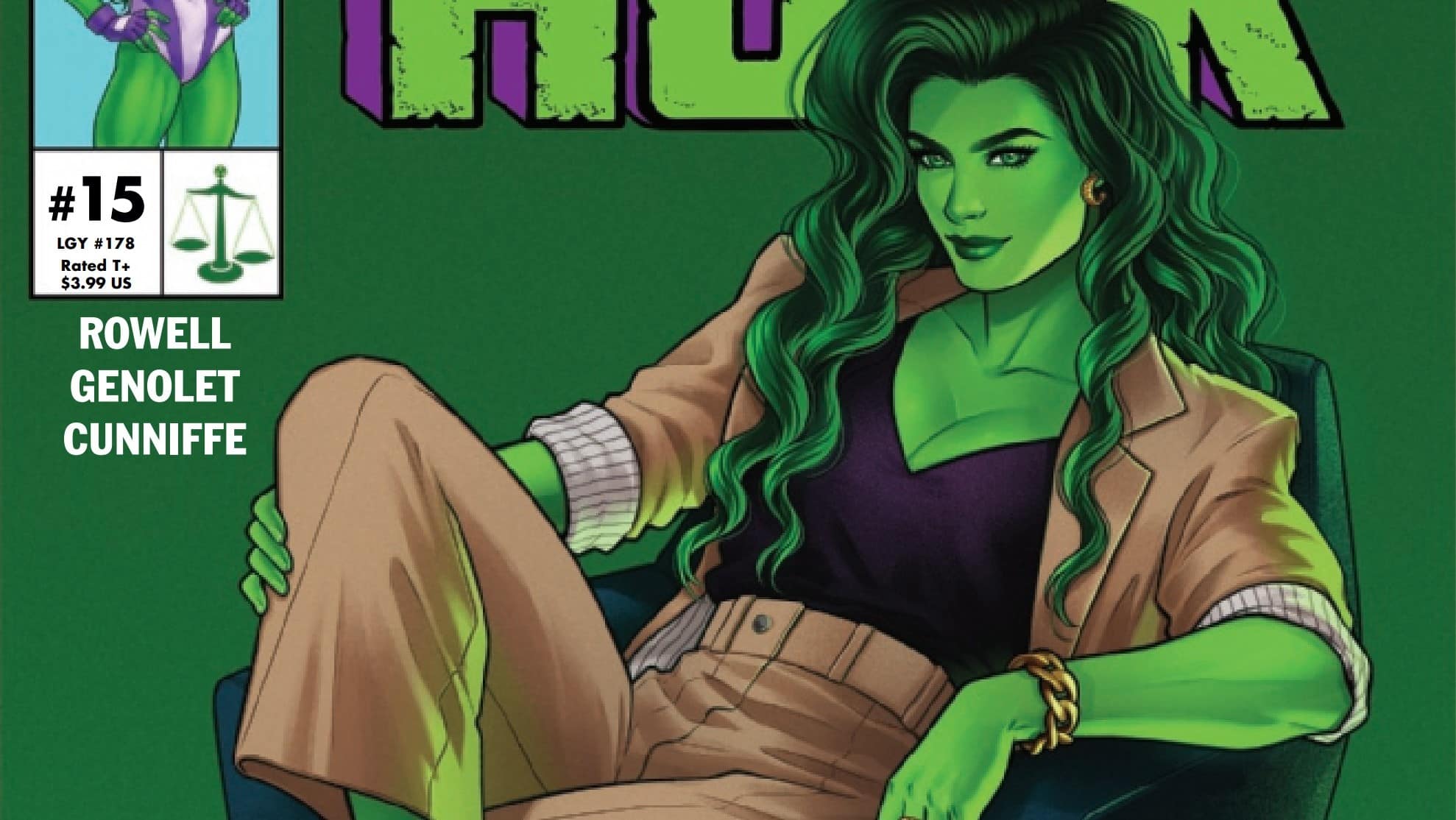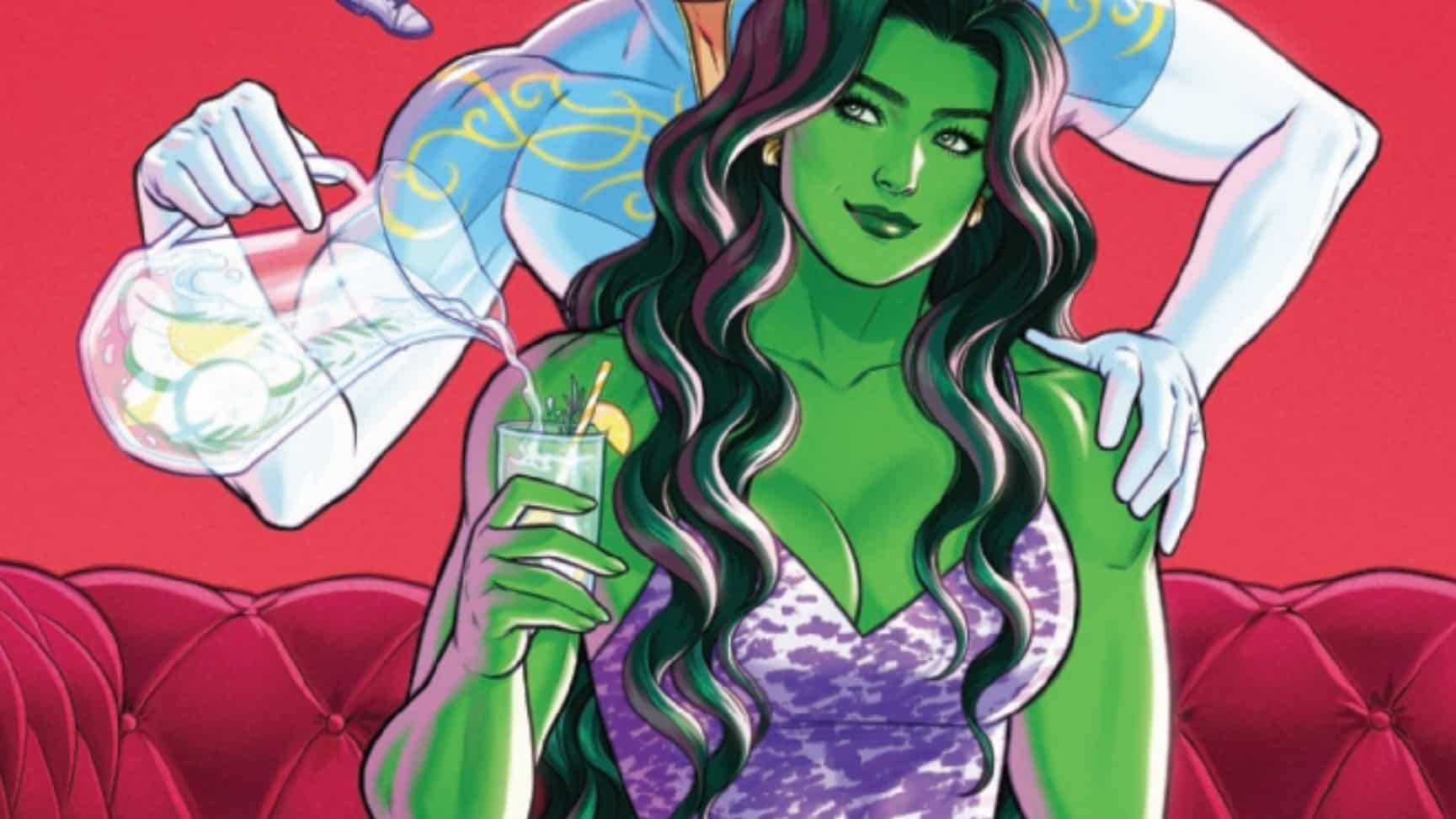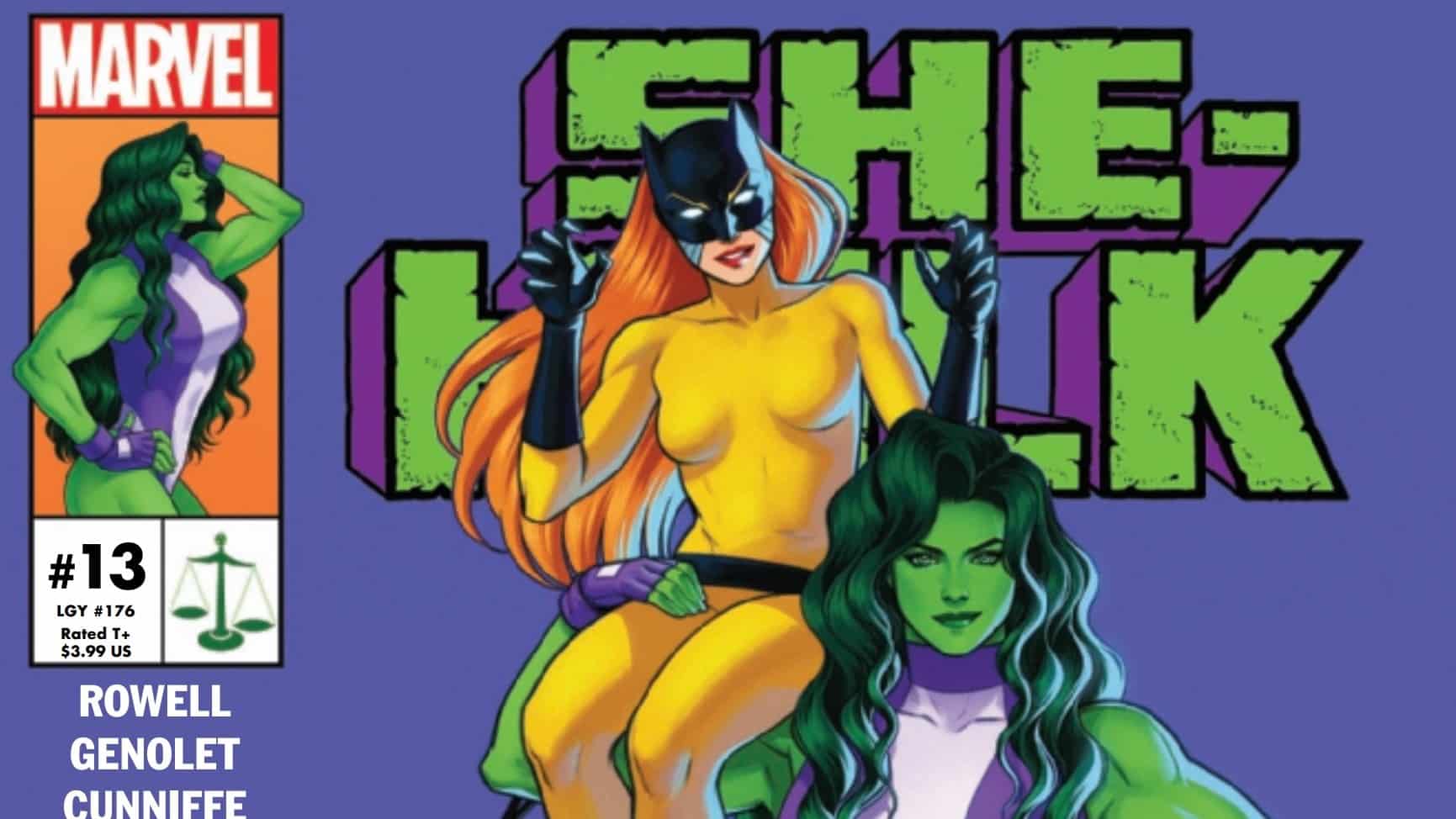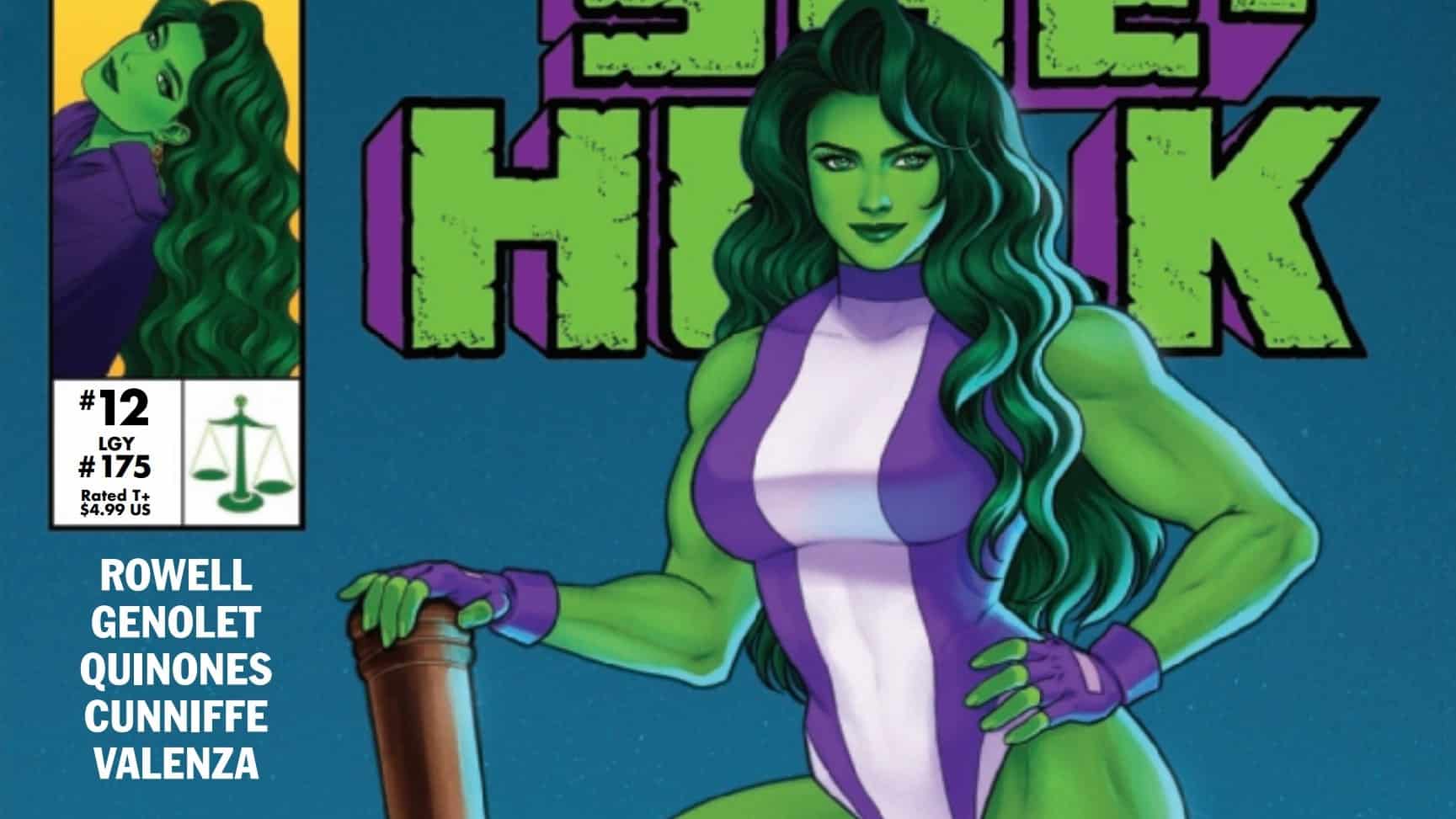Jennifer Walters is trapped. The bad guys have played their hand and shown us their origins. Things are at their worst, and everyone knows what that means: it’s showdown time. Can Jen defeat her villains, look great while doing so, and return to find a happy ending? Erm. Two out of three ain’t bad, right? She-Hulk #9 is written by Rainbow Rowell, drawn by Takeshi Miyazawa, colored by Rico Renzi, and lettered by Joe Caramagna.
Armaan Babu: A happy festive season to you, Stephanie! She-Hulk #9 might not be a Christmas issue, but it does have seasonal colors! The ever-present green of our favorite gamma-irradiated superhero, the red of the zero-energy draining her powers, and of course, the white of a certain sweater that gets spotlighted in a heart-wrenching moment right at the end. I certainly hope your holiday season’s been going better for you than it has been for Jen and Jack.
Stephanie Burt: Well that’s a low bar, no?

Two Out of Three
Armaan: I want one of two things from a good villain or a villain team. One, the villain has something interesting to say about the hero — holding up a dark mirror to our hero, showing how our hero has to better themselves to win, or showing why the villains hate our hero in the first place. Or, two, a fun gimmick. One both counts, the Booths are lukewarm villains with a lot of wasted potential. I like Mark and April Booth, but they’re handled just poorly enough for me to see that I could be liking them more.
Stephanie: Please go on. Hard same, so far.
Armaan: Their main gripe with She-Hulk is that she seems perfect. Beautiful, intelligent, and able to lift a bus over her head without breaking a sweat. Look, the Booths had two out of three of those before they started their villainous career path, and their accident is less tragic than it is dumb (okay, maybe I find it a little tragic). Their motivations feel more grumpy than pathological. Petty, yes, but you get the sense that it’s a hatred they’d set aside pretty easily if they had something else to focus on. In addition, Jen’s perfection – or the appearance of it – hasn’t really been something she’s struggling with throughout the series.
As a gimmick, the most interesting thing the Booths can be said to have is that they steal the powers of other superheroes but never quite get it right, and that’s stretching their description. What we get in She-Hulk #9 is watered-down villainy unworthy of a final showdown! I want my slice-of-life romance adventures back, because that’s where the book is strongest — the superhero side of things is falling flat for me. What do you think?
Stephanie: I think you’re right, and if anything you’re being nice to the Booths, who are so boring that their gimmick (stealing Hulk blood) has already been mocked by Marvel TV. Rainbow Rowell, whom I usually trust with a gimmick, got a whole issue (last issue) to make them interesting and she just couldnae (as Rahne might say). There’s interesting stuff in this issue but it has nothing to do with the Booths and their badness.
Armaan: The Booths go through the rote villainy required of a finale — kidnap the girl, and strap her into an ominous looking machine while explaining their plans, all just in time for the hero to show up and save the day. This being a She-Hulk comic, of course, Jen breaks out of her own bindings, so that she can try and protect Jack.
It’s a great fight scene, though. Renzi draws simple, cute cartoon figures — a proper fight scene is a thing of near-adorable comic chaos, in both senses of the word “comic.” Jack, armed with little more than hurled office furniture, is little more than a distraction, but Jen sure does get some great punches (and great sound effects) when going up against the brutish Mark.
Stephanie: The Booths don’t even expect Jack to show up: like most readers of Marvel comics in our world, they just haven’t thought much about him, except when his odd power source has come into play. My favorite panel in She-Hulk #9 comes right after Jack pops in: it’s that hurled office furniture. In one wide rectangle Jack throws a chair at April, who has stolen Jack’s energy powers and learned to talk like an Avengers baddie. “You think you can stop me with office furniture? You know the power I wield.” Miyazawa really sells that chair.
Armaan: In the course of the fight, April appears to get everything she wants – brain, to go with her brawn and a Zero Energy backpack to boot, which has been draining the gamma right out of Jen. She-Hulk’s at a major disadvantage here — leading Jack to make the sacrifice play.
Stephanie: That is: he sacrifices himself by absorbing the Zero Fluid energy that April had been using, without the suit that lets him contain it. This means that the energy will burn him out, but also that April won’t be able to use it. Right?
Turn the Page
Armaan: Y’know, Stephanie, I like to think we’ve done right by Jennifer. Showing up every month to talk about her book, following her adventures, cheering her on when things are going well for her — we’re good fans!
Stephanie: You know, I think we are. I’ve even stuck around this long for what seems to be an undeniably (gasp) heterosexual romance story. Which is not something I do every day.
Armaan: So when Shulkie starts tearing up the page and accusing us of enjoying a narrative that robs her of a happy ending, well — I’m a little appalled at Jen’s lack of trust!
I’m mostly joking, but it does feel like a big disconnect between the writing and its intended audience. We’re at issue 9 of a comic that has been more of a romantic comedy than it has been a superhero drama. I imagine that anyone who’s gotten this far is the kind of fan who’s been enjoying this relatively low-stakes comic.
Stephanie: Armaan is talking about the very dramatic moment more than halfway through in which Jen does something she’s done in previous series, and in the Disney/Marvel TV show about her, but never in Rowell and Miyazawa’s run up until now. In two conventionally laid out pages– conventional for this book, that is: wide flat panels like window blinds– and then in five, yes, five full-page single-panel spreads (which have to save Miyazawa some time), our Jennifer Walters rips up a trompe l’oeil comics page, breaks the fourth wall, and complains about the story she’s in.
And unlike Armaan, I think she’s right. Because she’s not addressing us in She-Hulk #9: when she yells “You’re no better than the rest of them,” she’s not complaining about her loyal readers. She’s complaining about her writers. Previous writers have been outright jerks (rhymes with “gone turn”) or questionable and exploitative (rhymes with “man plot”). To Rainbow Rowell, she says “You think you’re so good. Because you don’t follow me into the shower.” (Compare the Claremont Run’s magnificent, telling and shameful chart of X-Men shower scenes.) “Because you don’t bury me in crowd scenes.” (Remember the moment in Endgame when all the women superheroes fly in at once and are mostly never heard from again?) “But you’re just like the rest of them.”
Why? Because Rowell, too, dangles romance-plot happy endings and satisfying denouements in front of our heroine, playing on our sense that Jen can handle whatever Marvel throws her way, that she will always land on her feet, even though she never gets what she wants. I know and you know that for decades the only characters who got to stay happily, openly married with superpowers on Earth-616 were Reed and Sue, and now Jennifer Walters knows it too, and she isn’t having any of it, because she wants her Jack Hart-fueled Happily Ever After, and instead she knows, or “knows,” that Jack will get man-fridged.
Armaan: I have my fingers crossed that she’s wrong about that — I’ve loved their romance so far. Jen’s bitterness about Jack’s upcoming sacrifice is earned, but it feels misdirected in a way that keeps me from enjoying it completely. I enjoy a good fourth wall break, and I think having a moment like this that takes it seriously, that processes Jen’s pain and dread, and tries to make the reader feel a little guilty about enjoying the spectacle of it all? That lands — just not very smoothly.
I gotta ask, though — when you first read She-Hulk #9, how long did it take before you finally turned the page? I took a good long minute.
Stephanie: I’m sorry, Armaan. I’m afraid I just kept on reading.

An Ill-Suited Ending
Armaan: As we turn the page, we’re drawn right back into the action. It’s a Hulk vs. Hulk stare down as a wall of captions contrasts Jen’s place in a superhero world against Jack’s. Jen’s a protagonist. A pillar of the Marvel Universe. An important legacy, and someone we’re not going to see the back of any time soon. She’s even got her own Disney+ show!
Jack, however, is someone who’s been out of the comics for a good long while, and his most memorable appearance has been how his corpse was used to take down the Avengers Mansion. Jen is indispensable, but Jack? Jack’s expendable.
Stephanie: He’s gonna get man-fridged. And Jen bloody well knows it. Armaan, have you read John Scalzi’s delicious novel Redshirts? It’s not exactly what Rowell is doing here, but it’s two squares away. And readers, if you want to see a lot more– and more subtle– fourth-wall breaking, reader-tweaking, and Marvel self-critiquing, run, do not walk, to Leah Williams and David Baldeon’s perfect miniseries Gwenpool Strikes Back.
Armaan: Despite my problems with She-Hulk #9, I really felt this ending. It hammers home that Jack had very little life outside of his suit — or to put it another way, his superhero life. He was defined and confined by his powers, and the costume that came with it. Until recently, he rarely got to have anything else.
As he reabsorbs the Zero Energy, without the help of his suit, it starts to weaken, and possibly kill him. Even if he pops up, right as rain and none the worse for wear next issue, the sadness of this moment works for me.
Stephanie: He thinks he’s sacrificed himself to save Jen and/or the Earth from the awful Booths. Self-sacrifice is what he does. It’s his– no pun intended– calling card. And, yes, I felt it too.
Armaan: It’s strange that the saddest stories in this series come from Mark and Jack — both of whom are little more than sidekicks and romantic interests for the gamma-powered women superheroes. Mark’s tragedy is in having his intelligence and then losing it — Jack’s is in having had a taste of a normal life before having to give it up. It’s not a parallel that gets the spotlight, but it’s the one that struck the strongest chord with me.
What did you think, Stephanie?
Stephanie: I think Mark’s going to get his intelligence back next issue, thus making his story less tragic, and less like Jack’s, but also I think you’re right. What do you do when everyone around you, and you yourself, has spent your entire adult life seeing you as “expendable” (Rowell’s word), admirable as a martyr, and more or less built for self-immolation? As somebody who– apart from “the suit” that makes you a superhero– can’t survive and won’t count? What’s it like to live in the Marvel Universe as a recurring minor character who shows up to get knocked down? What’s it like to live in the real world, for that matter, and get told over and over that you’re a supporting character, a third-act sacrifice, and not a lead role? These aren’t questions a She-Hulk comic can answer, or not yet, but I like the way they get asked in She-Hulk #9.

Last Minute Legal Notes
- The sweater deserves its own mini-series. Marvel, make it happen! If you can do it for Jeff..
- Jen really did, as April snarks, “spend a year saying ‘Hulk smash’”: check out the Mariko Tamaki and Nico Leon Shulkie series to find out why.
- Jen stepping out of a finale that’s not quite working for her is something she did on her Disney+ show, too, though that Jen had a much bigger say in how her ending turned out.
- This really could have all been avoided if Jen had just picked Jack up and run away. Sometimes, you gotta know when to fold.
- It’s good that April no longer has a chibi head, so I can stop giggling every time she’s on the page.

